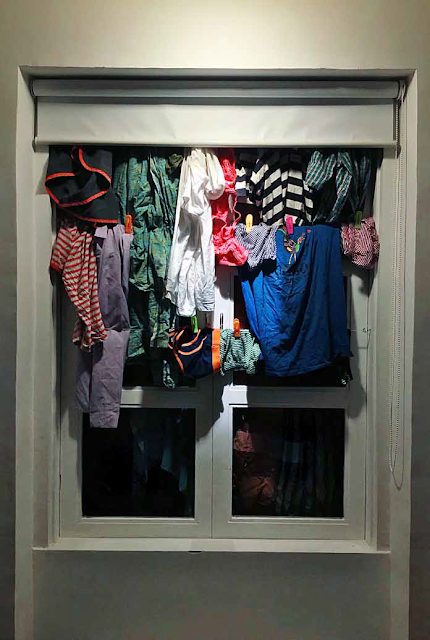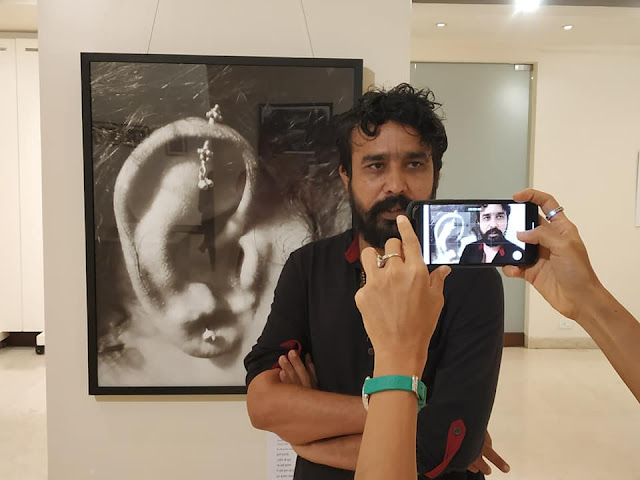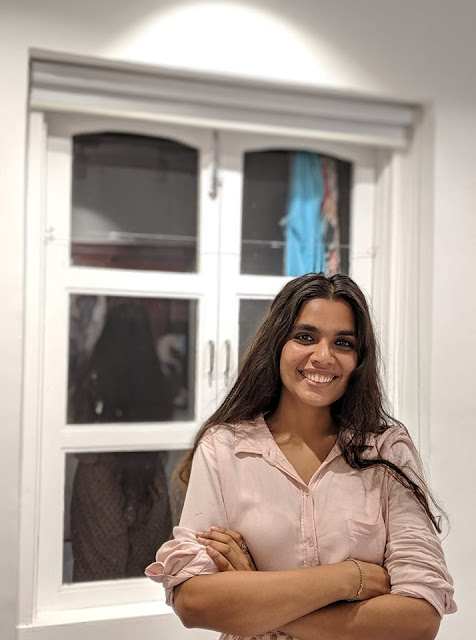- VS Gaitonde
- Ram Kumar
- Akbar Padamsee
- Amrita Sher-Gil
- Vanita Gupta
- Smita Kinkale
- Ratnadeep Adivrekar
- Tathi Premchand
- Nilesh Kinkale
- Prabhakar Kolte
- Chintan Upadhyay
- Prabhakar Barwe
- Shankar Palsikar
- Yashwant Deshmukh
- Prabhakar Kolte
- Sanchita Sharma
- Prakash Waghmare
- Ranjit Hoskote
- Premjish Achari
- Pankaja JK
- Contact
Tuesday, 10 September 2019
Sunday, 1 September 2019
More fetched towards abstract painting like V S Gaitone, Pual Klee and Nasreen Mohamedi - Heena Waghmare
Heena was born in 1990 Pune, Maharashtra, she has completed her study in BFA
Fine Art from Bharati Vidhayapheeth and MFA from SNDT Mumbai university, she is
known as Rebel abstract painter
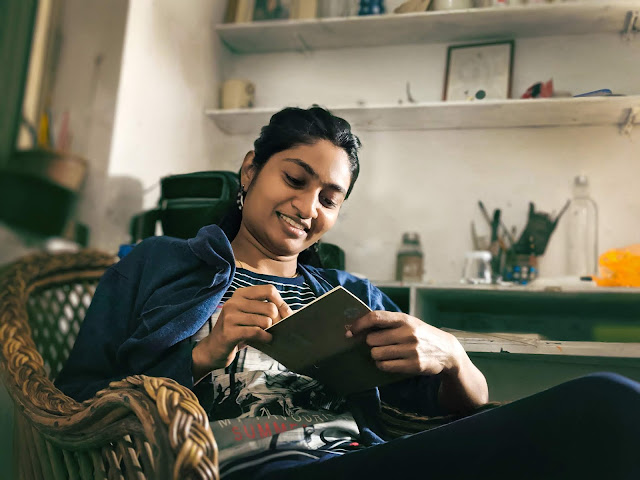 |
| Artist : Heena Waghmare |
Heena
began her career by she being inspired from her family, her family members are
signboard painter and most of them work for film set design, she enjoys old
calendar design and kept learning from people near her, she knew one painter
during her childhood ..M F Hussain.
She
belongs to Muslim family most of time her family stopped her painting. Since
childhood MF Hussian has always been her inspiration to go after her dreams. Before
Art school she painted ganpati and Mother Merry God at the same time. After a while
she got more interested to work in the field of Art and she loved reading books
of J Krashanamurti, while reading books she was more fetched towards abstract
painting like V S Gaitone, Pual Klee and Nasreen Mohamedi.
 |
| Rare Painting by Heena Waghmare |
Heena
says while working, conscious as well as sub conscious mind both are at work.
With all this thinking it is like one is searching own self. From the time she
started understanding pictures and paintings, rather than depicting them as
they are, she put them on canvas the way she saw it. The way they are to her,
the way she understands them. “Paint things that I visualize’’ is her way of
art.
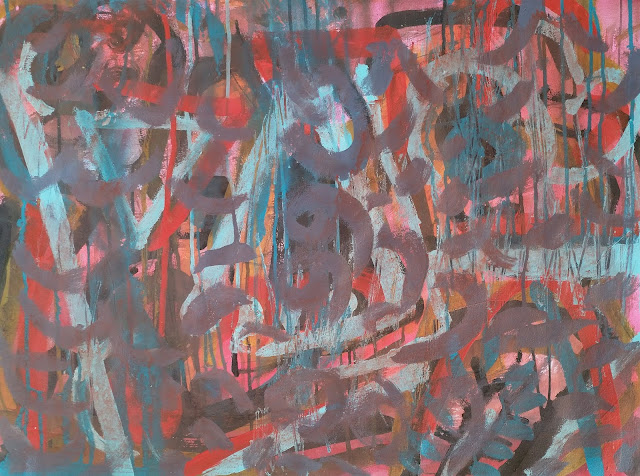 |
| Rare Painting by Heena Waghmare |
Henna’s
paintings are not just paintings, they are a bridge. Bridge that connects two
worlds, one that she carries inside her and that is her conscience in which she
always loves to discover a new color and paint with it and the other is her
outer world. Bad or good emotions, right or wrong morals and feelings, they all
build this bridge up. It goes without saying that when a bridge is built with such
strong rudiments, the travel from one world to the other is smoother.
Abstract painting she show lots layers of colour overlapping,
mostly she use pastel shades like gay and skin colour with light blue shade
This discovery of her own self is yet not over for her. She still
wants to discover herself and get this feelings travel to the outer world to
see through the bridge – Heena’s paintings!
- On behalf of Pankaja JK
Art Blogazine 2019
Thursday, 29 August 2019
'PRIYA Dube’s poetry and art speaks of her life' - Satarupa Bhattacharya
Art & Deal Magzine
New Delhi
Priya
Dube (1992) was born to a family belonging to Uttar Pradesh in Sumesherpur. The
family shifted to Bombay, where she was raised. Her journey in the field of the
arts began at an early age when she began to
sketch and draw her immediate surroundings. After she acquired a degree in
interior designing, she worked as
a designer for five years. Eventually, she found her calling as a fine art
practitioner and began her practice from
home.
Dube’s
poetry and art speaks of her life: a life that she chose to rebel against the
institutionalised setups with.
Her works speak of her resistance to the inculcated practices of boundaries
that has over the years
become our identity. In a society of norms that includes language, marital
status, class consciousness, and
occupational constructs, the very act of making art and writing poetry has
become a form of resistance.
Her
art speaks a language of the inculcated systems of womanhood, whereby,
womanhood is her boundary. This
is the boundary she breaks with her installation of clothes lined up against
the windowpane, which she calls
“Your Thoughts Drying Under the Sun, Night will be Sunshine with Hair”. The
installation speaks of
how we hang our minds out to dry, while we mull over our situations on an
everyday basis.
The clothes lined up are a regular middle-class household sight, where lining them up is the easiest and fastest way to find them and arrange them. Her installation shows the convenience associated with her daily life, where she finds herself constantly rummaging through her surroundings for details that accentuate her being. Similarly, the self-portrait is an insight to how she looks at herself. A poem that describes her yearning to be one with what she looks at while looking deep within herself is included as the title and a part of the painting. Her words enunciate her desire and longing that she has buried within herself. This journey is not only spiritual but also political, where she discloses her utmost desire to be seen as a capable being and a desirable one at that. The genitals are so regularly decisive of what or who we should become and how prolifically homogenized is that idea that she creates several images of the vagina to dismount from the stationed notions of gender.Here, she includes a poem that describes the mood of the vagina. Thereby, she brings forth the point of consent and the dilemma of gendered desire. Her other works to speak of her daily interactions with her surroundings and with the core of her existence.
The clothes lined up are a regular middle-class household sight, where lining them up is the easiest and fastest way to find them and arrange them. Her installation shows the convenience associated with her daily life, where she finds herself constantly rummaging through her surroundings for details that accentuate her being. Similarly, the self-portrait is an insight to how she looks at herself. A poem that describes her yearning to be one with what she looks at while looking deep within herself is included as the title and a part of the painting. Her words enunciate her desire and longing that she has buried within herself. This journey is not only spiritual but also political, where she discloses her utmost desire to be seen as a capable being and a desirable one at that. The genitals are so regularly decisive of what or who we should become and how prolifically homogenized is that idea that she creates several images of the vagina to dismount from the stationed notions of gender.Here, she includes a poem that describes the mood of the vagina. Thereby, she brings forth the point of consent and the dilemma of gendered desire. Her other works to speak of her daily interactions with her surroundings and with the core of her existence.
“Love
Box with Smoking Ideas”, a depiction of several images from her everydays, and “Beautiful
Mind”,a
combination of several aestheticized pictures of people, are evocative of
everything that has visually pleasured
and plagued her. Such a range emphasizes her keen ability to look deep within
and outside the peripheries
of the society she struggles with as a woman and as a metropolitan individual.
All
in all, Dube’s works are evocative of our every day, whereby, making it even
more plausible for us to see what
we don’t want to see. Her works enables us to see which we have seen every day
and have functionally desensitised
ourselves towards. Her anguish, her love,her desire, and her ability to mull
over all that she is or
is to become has all been set right in front of our eyes to witness. In doing
so, we are not only witnessing her
journey but the journey of our collective existence.Therefore, Dube’s works
speaks of us all.
Nippon Gallery
30/32, 2nd Floor, Deval Chambers,
Nanabhai Lane, Flora Fountain, Fort, Mumbai - 400 001/ Tel: 022 66333997
Mumbai, Maharashtra
30/32, 2nd Floor, Deval Chambers,
Nanabhai Lane, Flora Fountain, Fort, Mumbai - 400 001/ Tel: 022 66333997
Mumbai, Maharashtra
Friday, 16 August 2019
ART & SOUL : Text Part III: Subaltern Sexuality-Body as Text
‘In literary theory,
a text is any object that can be “read”, whether this object is a work of
literature, a street sign, an arrangement of buildings on a city block or
styles of clothing. It is a coherent set of signs that transmits some kind of
informative message […]’ explains Wikipedia.
In contemporary Indian art we continue to evolve the genre
of the human figure or portraiture as representations of our culture and its
unspoken dimensions. The photographic portraitures may represent new dimensions
of ( trans) sexuality, gender, queer groups or focus the unspoken through the
subaltern. My focus is the gaze of
the protagonist in the picture should meet the onlooker.
Every human being experiences a discreet sexuality which is
silently there, often in all human actions and expressions. Often these
experiences are repressed, except gentle suggestions in human conversations.
Sexuality is deeply silenced or means “layers of silencing” in common human
experiences. Spaces and right to conversation about one’s sexuality/ sexual
identity are few and nil especially for
the subalterns (economically, culturally and socially dispossessed).
Consequently, “speech as expressions of sexuality” and ruthless violence are deeply
entwined.
Sexuality forms an important aspect of human identity. The
discourse on sexuality breaks on the experiences of the “materiality” of the
human body. There is no other consequence that shapes one’s sexuality than the
materiality of the human body. How is one to negotiate these transforming
inwardly human experiences during childhood-puberty onwards? What is the nature
of subaltern sexuality? How does it manifest itself as a poignant reflection of
the self for most humans? In “Subaltern Sexuality: Body as Text” one may be
able to read the deeply unspoken, through-in the bodies of the protagonists.
The incredible voices from within- its manifestation as a poetic content of the
world or home (within) plays with inevitable control through punishments and silenced
power abuses.
Sexuality is a bundle of energy when politicized- gets
recognized in the “queer moment/s” that any given social/cultural space
creates, making aware of one’s emerging/ transforming sexual identity. Several
such moments become really poignant for oneself to observe also the rupture
from within. A tearing inner voice acquires within as the gaze returned
(looking at the camera lens). Often the bare gaze of the protagonist is layered
and poetic with these expressions. The visuals are subtle and strong manifesting
the unspoken in their meeting of gaze with the onlooker.
Shubhalakshmi Shukla
Curator

1, Madhuli, Shiv Sagar Estate, Dr Annie Besant Road, Worli, Mumbai, India
400018 Mumbai, Maharashtra
400018 Mumbai, Maharashtra

022 2496 5798
Monday, 12 August 2019
Monday, 24 June 2019
My body my life partner Isn't your body your life partner? Priya Dube Solo show at Nippon Gallery Fort Mumbai -1
PRIYA DUBE ( 26 ) was born in Sumesherpur, Uttar Pradesh. And she has been raised in the metropolitan city of Mumbai. Priya stays with her family in Mumbai. The artist began her professional career as a trained Interior Designer from Rachna Sansad Mumbai and has gradually veered towards visual art since the past four years. Her work comprises Multi-disciplinary art and as she mentions “I have learnt everything from my surroundings. Being self-taught, I have become an individual expressionist based on my keen observation towards the situations, people, emotions and my experiences”.
One of the abiding influences has been her North Indian family background which has been a unique amalgam of traditionalism and modernity! Growing up in such a milieu her body’s development from childhood to adulthood was a defining moment both in terms of her family’s outlook towards her and her exploration of her own body. She also mentions that it’s not about being feminist, it is about deeply connecting with one’s own self both physically and emotionally whether one is male or female. And then it is also about being in sync with accepting and fulfilling the body’s emotional and physical desires.
Self portrait
To be one
To be the one
I have crossed the bridges
Of thousand love stories
Now I incline
To
My body
My soul
To a new journey
Discover the new me
Nourish the new me
Embrace the new me
The body is the layer of lust and love
We crave for the lust to be loved
But not love the lust
They look at me
As if the story is common
I look at them that the story is uncommon
Having said that
You still kiss me under the moonlight
Thinking today I will moan
Saying your name
I crave for you
As you crave for me
We make love in the minds
And
Fight between those words
Staying close to you gives me immense peace
Staying close to sea gives me the similar feeling
I ask myself do I love myself more than you
( smiles )
My body responds yes you do
I do I do I do
And we decide to be one
My body my life partner
Isn't your body your life partner?
 |
| Recen work at Nippon Gallery Fort Mumbai -1 |
Since the past one and half years I have spent a lot of tome delving deep into my body. And I have transcended the societal boundaries I had imposed on myself all through my growing up years! And I feel like a conqueror now!
The concept of this show began with photographs I clicked of my nude self to better connect with the forms of my body. As I started sensing every body part I developed a connection between them and my surrounding situations. I also clicked other pictures that gave me new stories which have been depicted in the pieces on display!
I choose mix media as my expression because I can narrate them in drawings, photography, film and audio. I believe in mix media because every expression touches a different sense of the body and this helps in giving a better connection to the story.
Tuesday, 18 June 2019
Saturday, 4 May 2019
According to Revati, the self-reflection stemming from challenges related to exclusion... - Hansodnya Tambe
Inquisitiveness
is a basic human instinct. The urge to process and analyse visual information
is the genesis of artistic innovation. Remembrance of things past is a result
of the beholder’s visual sensitivity and unyielding curiosity. It is through
this prism that a human seeks to track the central focal points of his life,
i.e. through contemplation. It serves as a means to delve into the depths of
art. ‘Art’ is the essence of human experience. Concepts such as existence,
love, pleasure, or truth are abstract forms of artistic visual creations.
An artist’s
painting is nothing but an attempt to self-contemplate through in-depth
exploration of various visual forms. Such quest resides at the core of any true
artist or connoisseur. It is precisely such inquisitive exploration that
forms the basis of Revati’s paintings. Her academic training in Fine Arts, and
deep deliberations on her themes, is evident in her creative expressions.
The artist’s
clarity about her character’s personalities, and her endeavour to use them for
discovering intellectually-stimulating visual forms serve as a means to view
her paintings. She believes her concepts are deep-rooted in everyday
experiences. According to Revati, the self-reflection stemming from challenges
related to exclusion, interpersonal conflicts, despair, denial, or rejection
set us on unknown pathways/ odysseys. Painting is one such pathway, and in such
creative expression lies art, she says. Simply put, paintings are a gateway.
They help enhance one’s personal life through experiential knowledge, as much
as truth, compassion, happiness, love, etc. do. Life itself is an inspiration
then.
Revati’s visual
expression uses familiar experiences, thoughts, objects, structures, settings,
and pictorial elements, presenting them as a story board/ screenplay, making
the different works seems like a serialized novel. The viewers are free to
interpret the paintings their own way, since ‘storyline’ is the prominent
premise of each artwork, which can be subjective. The sketches, forms,
textures, and compositions in her paintings sometimes veer towards realism.
However, at the point where the (metaphorical) representation of the visual
inquisitiveness transcends towards extremely-realistic depictions – is where
her art becomes mysterious – requiring careful coding-decoding of the
visuals to enjoy its best impact. It appears that the story has been narrated
through discerning occupation of the entire canvas space using visual forms,
instead of dividing it.
A lot of artists
strive to subdue or inflate their egos or entities, during their process of
self-contemplation. Such attempts seem absent in Revati’s paintings. Curiosity
appears to be the prime driver of creation, giving the figures, shapes, colours
and textures in her paintings, a touch of naivety or innocence. The works are
sprinkled with dreamy poeticism. One of the works evinces the visual
sensitivity of the realist painter and printmaker, Edward Hopper. There is an
urban tone to the treatment of the paintings, as well as the rendering and
application of colours. The passionate pursuit to carve out one’s own
emotional, imaginative, and inquisitive space amid the comfortable, yet chaotic
life of the city is evident through the series.
It is imperative
that art must be viewed with an open mind and a clean
heart, with total devotion and submission. And only once the ‘viewing’ is done,
that the process of ‘feeling’ begins. That’s how it is!
- Hansodnya
Tambe
जिज्ञासूदृश्यघडण
'जाणणे' हा मनुष्याचा गुणधर्म आहे.दृश्य जिज्ञासूवृत्ती ही कलेच्या अन्वेषणाची जननी आहे. पाहण्याची संवेदनशीलता व जिज्ञासूवृत्ती
यामुळे स्मृतीरूपांची शृंखला तयार होते.यातून मनुष्य जीवनाच्या केंद्रस्थानी स्वःताला रूजवू पाहतो.हा स्वाध्याय आहे. तेव्हा आपण कलेच्या गाभाऱ्यात पोहचतो.'कला' मानवी जीवनाचा अनुभव आहे.जीवन, प्रेम, आनंद, सत्य ही कलेच्याच दृश्य जीवनमितिची अदृश्य रूपं आहेत.
चित्रकृती मधून दृश्य जिज्ञासाच्या रूपाने
आत्म-अन्वेषण करणे. हा चित्रकारांचा, रसिकांचा स्वभाव गुणधर्म आहे. जिज्ञासेचा हाच गुणधर्म 'रेवती' यांच्या चित्रकृतींचा आधार आहे.इथे जिज्ञासा हि रेवती यांच्या चित्रकृतींची
जननी आहे. हे चित्रकृतीतून दिसून येते.
रेवती यांच्या कला शिक्षणाचा, रीतसर कलाअभ्यास व अध्ययन पूर्ण झाले असून, चित्र अभिव्यक्ती करताना तें त्याचा योग्य
उपयोग करतात.रेवती यांच्या चित्रकृतींचा स्वभाव व
स्वतःच्या चित्र निर्मितीच्या बाबतचा, दृश्य वैचारिक शोधबोध, हा त्यांच्या व्यक्तीगत पातळीवर स्पष्ट असल्याने, त्यांच्या
विचारांच्या आधारे त्यांच्याच चित्रित दृश्याला पाहण्याचा एक मार्ग सापडतो. त्या म्हणतात त्यांचे विषय जीवनानुभवाशी
निगडीत आहेत.जीवनांत येणारे मानवीय संघर्ष, असंतोष, अपवर्जनांची आह्वाने, अस्वीकार, निराशा, आणि असहमतीचा प्रभाव यातून आपण आत्म-अन्वेषण करून मार्गस्थ होतो. हा एक मार्ग म्हणजे 'चित्रकृती' किंवा अभिव्यक्ती होय. यालाच त्या कला असे म्हणतात. म्हणजे चित्रकृती एक महाद्वार आहे.सत्य,आनंद, प्रेम करूणा या बरोबरच स्वताचे ज्ञानानुभवात्म्क व्यक्तिगत
जीवन समृध्द करायला चित्र योगदान करतात.त्यांना ही जीवन यात्राच प्रेरणा देते.
रेवती यांच्या सचित्र दृश्यअनुभवाचा मार्ग हा
सभोवतालच्या ओळखीचा अनुभव, विचार, वस्तू,वास्तु, निसर्ग, दृश्य यातील आकारीक अनुभव कथांना, कथनरुपात साकारत चित्रकृती पूर्ण करतात.म्हणून त्यांची दृश्य सचित्र कांदम्बरीच्या
शृंखलेत साकारलेली जाणवतात. म्हणून त्यांच्या चित्रकृतींची स्वभावभाषा
सचित्र नवनीत कथापटाप्रमाणे भासतें.
'कथन' हे चित्रांचे मुख्य वैशिष्ट्य असल्याने, तें प्रत्येक रसिकांनी स्वताच्या अनुभव
संचितानुसार अनुभवावे.चित्रकृतीत रेखाटन,आकार,पोत, रचना, याद्वारे दृश्यकथन गुंफताना, दृश्यकथानक कधी कधी अतिवास्त्वाच्या यथार्थ चित्रणाकडे
वळणघेते. चित्रकर्तीच्या जिज्ञासेचा वास्तवातल्या
रूपकाकडून, कल्पनेतील अतिवास्तवाच्या रूपाकडे कल गेलेला
दिसून येतो.तेव्हा ती चित्रकृती गुढ होवू लागते.मग दृश्यांचे कूट (कोडिंग) उकल (डिकोडिंग)करत चित्रकृतींचा रसास्वाद घ्यावा लागतो. चित्रांमध्ये अवकाश विभाजनापेक्षा, अवकाश आकारीक संवेदनेने व्यापून दृश्य कथन
चितारलेले दिसते.
 आत्म-अन्वेषण करतांना स्वताचे अस्तित्व, अहंकार शमविण्यासाठी किंवा वाढवण्यासाठी अनेक
चित्रकृतीकार प्रयत्न करतातच.याची छटा रेवती यांच्या कृतीत दिसत नाहीत. येथे फक्त जिज्ञासा दिसूनयेतेम्हणून त्यांच्या चित्रातील आकृती, आकार,रंगअंग, पोत, रचना, अप्रौढ, निरागस, अप्क्व, निष्पाप धाटणीच्या दिसून येतात. चित्रकृतीत स्वप्नील काव्यमयता विखुरलेली आहे. एका चित्रकृती मध्ये एडवर्ड हॉपर सारखी दृश्यसंवेदना स्पर्शून जाते.शहरीधाटणीची संवेदना व रेखाटन, रंगलेपन पद्धती आहे.समृध्द जीवनाच्या अडगळीत व शहरीकरणातील
जगण्यात स्वताच्या भाव विश्वाचा, कल्पनारम्य विश्वाच्या वातावरणात जिज्ञासूवृत्तीने शोध
घेण्याचा पूर्ण प्रयत्न दिसून येतो.
आत्म-अन्वेषण करतांना स्वताचे अस्तित्व, अहंकार शमविण्यासाठी किंवा वाढवण्यासाठी अनेक
चित्रकृतीकार प्रयत्न करतातच.याची छटा रेवती यांच्या कृतीत दिसत नाहीत. येथे फक्त जिज्ञासा दिसूनयेतेम्हणून त्यांच्या चित्रातील आकृती, आकार,रंगअंग, पोत, रचना, अप्रौढ, निरागस, अप्क्व, निष्पाप धाटणीच्या दिसून येतात. चित्रकृतीत स्वप्नील काव्यमयता विखुरलेली आहे. एका चित्रकृती मध्ये एडवर्ड हॉपर सारखी दृश्यसंवेदना स्पर्शून जाते.शहरीधाटणीची संवेदना व रेखाटन, रंगलेपन पद्धती आहे.समृध्द जीवनाच्या अडगळीत व शहरीकरणातील
जगण्यात स्वताच्या भाव विश्वाचा, कल्पनारम्य विश्वाच्या वातावरणात जिज्ञासूवृत्तीने शोध
घेण्याचा पूर्ण प्रयत्न दिसून येतो.
मनांतला ओरखडा आज बहरून आला ।
आठवणींच्या फुलांचा सडा पडून गेला ॥
कला हि निसंशय श्रध्दा असेल तरच अनुभवता येते. कलाकृती हि विश्वास ठेवूनच पहावी लागतें. पहाणं पूर्ण झाले की, जाणवणे शुरू होते. इतकंच!
-
हंसोज्ञेय
तांबे
Subscribe to:
Posts (Atom)


